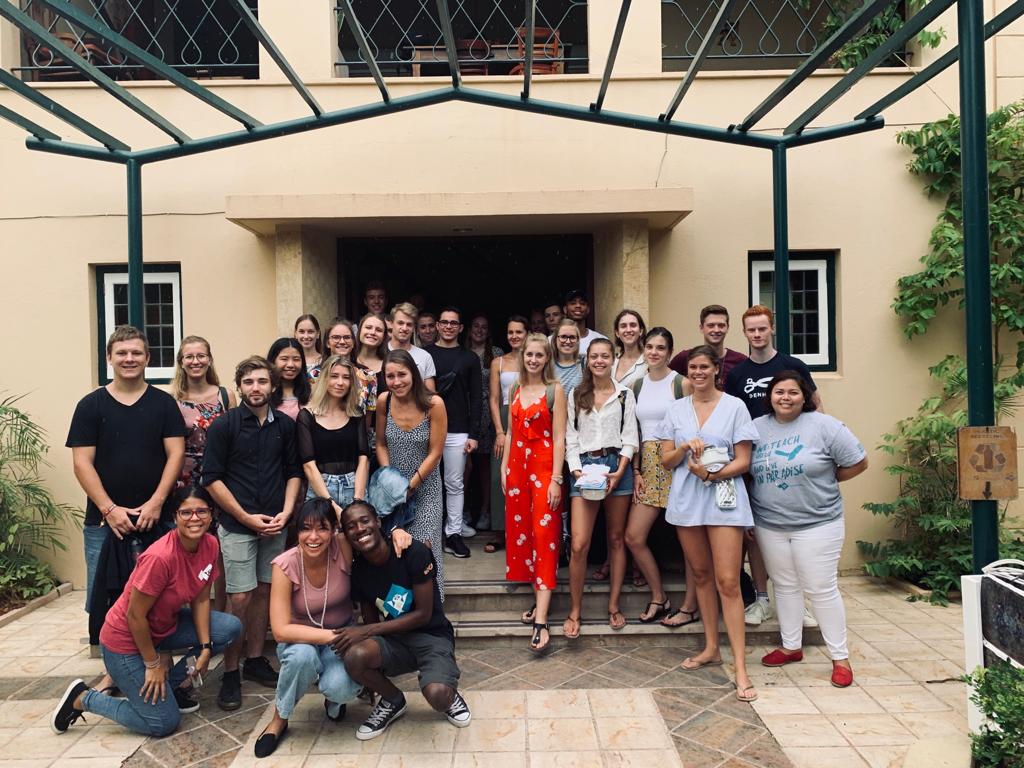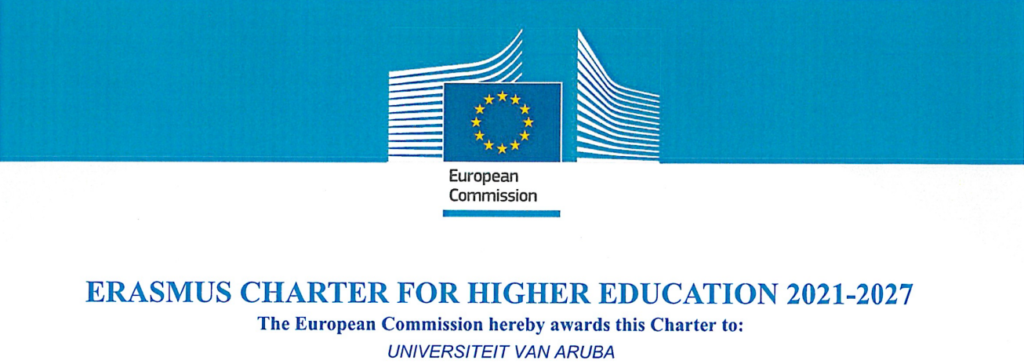About Erasmus+
Erasmus+ seeks to boost the job prospects and the personal development of young people. It helps our education, training, and youth systems deliver teaching and learning that gives people the skills they need in today’s and tomorrow’s labor market and society.
*This video is in dutch
Erasmus+ students

Students can spend 3 to 12 months studying at a university or college in an EU country. Alternatively, students can do a traineeship in a workplace abroad lasting from 2 to 12 months.
Recent higher education graduates can also do a traineeship abroad within 1 year of graduation. But plan ahead! You have to be selected by your university or college during your last year of study.
Erasmus+ also supports some European students to study in the rest of the world and students from elsewhere in the world to study in Europe.
Learn more about Erasmus+Erasmus+ charter
The University of Aruba has recently been awarded the Erasmus Charter for Higher Education and is now in the process of establishing exchange agreements with partner universities abroad to enable students and staff from the University of Aruba to apply for financing for a period of study or training abroad as of the academic year 2015-2016. And to allow students and staff from participating universities abroad to experience university life in Aruba!

Erasmus+ policy statement
Erasmus Policy Statement (EPS)International collaboration
An outward-looking perspective and reach for international collaboration are characteristics that have shaped the University of Aruba from its start. The birth of the University was midwifed by means of international collaboration and its expansion has likewise been nursed through partnering with international universities. Also for the future, international collaboration remains key to its overall vision and strategy, and Erasmus+ is a pivotal component part of that strategy.
In geographical, political, and cultural terms Aruba is located in the overlapping center of Europe, the Caribbean, and the Americas. It is a part of the Kingdom of the Netherlands, an EU Overseas Country, and Territory, and its citizens have EU citizenship. It has strong personal, cultural, and economic ties with North and South America as well as with its sister states of the Caribbean Basin. Aruba’s central position and its concomitant multicultural and multilingual context are natural assets the University seeks to deploy to the fullest. As such, the University aims to contribute to the transatlantic relationship between Europe and the Americas. It aspires to be a nexus — a central place and space, both physically and virtually — for the meeting of the minds; inviting scholars, researchers, teachers, and students from Europe, the Caribbean, and the Americas to collaborate in learning and research. We seek, therefore, to gradually play a central role in fostering collaborative relations among partners from universities across Europe and the Americas in teaching, knowledge, and research.
How we choose our partners
The University of Aruba and its Faculties look for international partners that are compatible in terms of size, (quality of) programs, accreditation, teaching, and/or research. Balanced and mutually beneficial partnerships are the aim. In respect of mobility, in particular, the University of Aruba aims to ensure genuine added value (academically, professionally, culturally, and/or personally) for participating – incoming and outgoing – students and staff. The University is committed to providing high-quality support to participants before, during, and after mobility, ensuring as far as possible that their experience is a positive one. Programs should be monitored and difficulties should be addressed in a transparent and collaborative spirit. The University of Aruba asks the same of its partners.
In which geographical area(s)
In line with its overall strategy, the University of Aruba is seeking to build its partnerships not only in Europe but equally in the Americas and the Caribbean. The University’s vision is based on the assumption that Aruba’s comparative advantage lies in the fact of being able to bring together people from all these regions with relative ease. Participation in the Erasmus+ Program provides a sound basis for the University to expand its European partnerships and be the driving force behind the University’s overall internationalization agenda by making mobility and international cooperation an integral part of the academic life of students and staff. At the same time, the University will continue to strengthen existing partnerships in the region and explore new opportunities in the Americas and the Caribbean Basin, aiming to ultimately join these networks and their people.
The most important objectives and target groups
For the University of Aruba international mobility and cooperation are considered a catalyst for innovation and the improvement of the University’s governance, its programs, research, and teaching. For this reason, it will continue to encourage its staff and students to participate in mobility programs. It will also encourage staff to set up new international cooperation projects in research and teaching.
By providing opportunities to study abroad the University aims first of all to give students a valuable and exciting academic, cultural, and personal experience that is bound to broaden their horizons and to better equip them for the challenges and opportunities of a global labor market, and more generally, to allow them to pursue their ambitions wherever they may lead them. Mobility programs for students also serve an objective that is more specific to the local context. Many of Aruba’s young prospective students, having grown up in a small island nation, understandably feel the need to take up a study abroad. For some, this is financially not feasible; for others, the experience and responsibility come too early, resulting in disappointment. At the same time, for some of those that do successfully take a degree abroad returning to Aruba for work is not an option in financial terms. By providing high quality and accessible mobility opportunities, the University of Aruba is committed to providing a genuine alternative for Aruba’s prospective students to study in Aruba but with the opportunity to spend a substantial period of time abroad and to grow.


